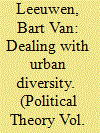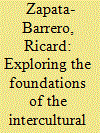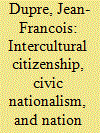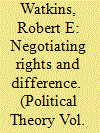|
|
|
Sort Order |
|
|
|
Items / Page
|
|
|
|
|
|
|
| Srl | Item |
| 1 |
ID:
099571


|
|
|
|
|
| Publication |
2010.
|
| Summary/Abstract |
Intercultural citizenship seems to benefit from certain generic aspects of city life that carry a negative quality, such as "blasé attitude" or the typical "indifference" of city dwellers. The main part of this essay argues that this observation allows the formulation of a moral minimum-a threshold conception-of intercultural citizenship in the urban setting, namely, what I call side-by-side citizenship. A certain level of indifference makes possible personal freedom and a tolerant multicultural city, although there are more ideal formulations of intercultural citizenship, such as in terms of agonism or cosmopolitanism. However, these more ambitious forms easily become too demanding given the muddle of everyday urban living conditions, which tend to promote mutual reserve and impersonal social relations. A modest and realistic conception of intercultural citizenship could prove crucial in motivating citizens to act according to some minimal standards.
|
|
|
|
|
|
|
|
|
|
|
|
|
|
|
|
| 2 |
ID:
143648


|
|
|
|
|
| Summary/Abstract |
In this second decade of the twenty-first century, interculturalism is emerging as a new policy paradigm to deal with diversity dynamics. It is basically viewed as a set of policies sharing one basic idea: that the interaction among people from different backgrounds matters. Its concerns are to intervene politically and to propose a way to manage the dynamics of diversity, based on exchange and interpersonal relations. I propose exploring a foundational internal debate, based on the premise there are at least three different, but complementary, normative strands: contractual, cohesion and constructivist strands. My ultimate purpose is to defend a comprehensive view, grounded on the argument that no one can have the sole authority to define intercultural policy, since the three strands can be applied at different moments, according to different purposes. The challenge is for policy managers to be able to achieve a balance between the three policy drivers.
|
|
|
|
|
|
|
|
|
|
|
|
|
|
|
|
| 3 |
ID:
115348


|
|
|
|
|
| Publication |
2012.
|
| Summary/Abstract |
This article analyses the current citizenship-nation building nexus in Québec in light of government publications and recent public discourses on ethnocultural pluralism and immigrant integration. First, the article surveys the changing relationship between Québécois nationalism and citizenship according to political circumstances in Québec, suggesting that debates over immigrant integration have played a central role in the creation of a civic Québécois identity, initially based on French as the public language and interculturalism. The article then analyses recent public debates surrounding 'reasonable accommodation' in Québec, and identifies a growing emphasis on laïcité - the secularisation of the public space - as identity marker. This article attributes this growing focus on secularism to dissatisfied nationalists seeking to reclaim the cultural prominence of the French Canadian majority in provincial institutions and press for measures aimed at enhancing Québec's distinctiveness and autonomy within the Canadian institutional framework. On a more normative note, the article argues that while language nationalism is reconcilable with ethnocultural pluralism, recent discourses on the secularisation of the public space constrain the emergence of an openly pluralistic stance on national belonging in the province, and undermines the legitimacy of Québec interculturalism.
|
|
|
|
|
|
|
|
|
|
|
|
|
|
|
|
| 4 |
ID:
073756


|
|
|
| 5 |
ID:
194317


|
|
|
|
|
| Summary/Abstract |
This article assesses whether multiculturalism, interculturalism and cosmopolitanism find themselves in tension or, rather, coexist in UK politics. This is done through the analysis of recent policy and civil society documents, complemented with semi-structured interviews with race equality organizations. Results suggest a complementary relationship between these normative perspectives, with interculturalism and multiculturalism jointly shaping the central government’s policy as well as the discourse of civil society organizations. As for cosmopolitanism, it manifests itself primarily in civil society’s support for a more humane system for asylum seekers, as well as in the endorsement of EU intervention in the governance of cultural diversity.
|
|
|
|
|
|
|
|
|
|
|
|
|
|
|
|
|
|
|
|
|